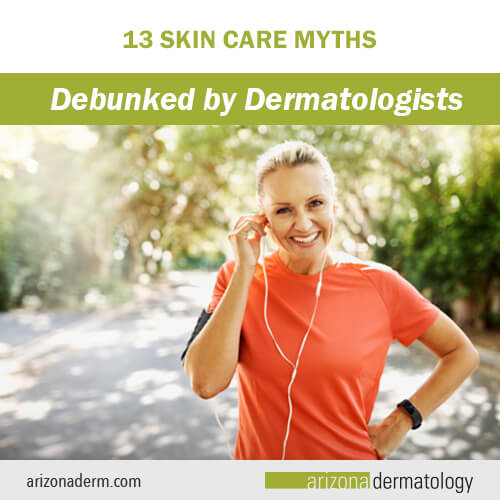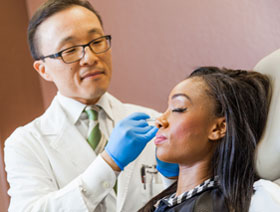 There are many myths about skin care that you may have believed from childhood. Perhaps your parents told you that you had pimples because you didn’t wash your face enough (not true) or that antibacterial soaps were the best for skin (they upset the skin’s natural biome).
There are many myths about skin care that you may have believed from childhood. Perhaps your parents told you that you had pimples because you didn’t wash your face enough (not true) or that antibacterial soaps were the best for skin (they upset the skin’s natural biome).
Our dermatologists open up about more common misconceptions about skin that you can stop believing today.
Myth #1: Eating greasy food causes acne. Acne is caused by excess oil production, clogged hair follicles, bacteria and inflammation. That said, acne has a genetic component and can be triggered by hormones, stress, medications, and (perhaps) certain foods. The link between diet and acne is still up in the air in the scientific community, but recent studies suggest that refined carbohydrates (like sugar and white flour) may contribute to the development of acne rather than greasy foods.
Myth #2: Wash with hot water to open your pores. Pores don’t actually “open” or “close” due to temperature. When you wash your face with hot water, your skin swells, making it appear that your pores have opened, but all you’ve done is stressed your skin. Wash your face with lukewarm water, which is less irritating.
Myth #3: Clean skin is “squeaky clean.” That tight, stretched feeling your skin has after you use a harsh cleanser, toner or astringent does not indicate that your skin is clean. What it shows is that you’ve stripped your skin of its natural moisture barrier, which is key to keeping skin healthy and supple. Our dermatologists recommend a gentle cleanser suited to your skin type instead.
Myth #4: Darker skin needs less sunscreen. Darker skin may not burn as easily, but it is just as susceptible to skin aging and DNA damage caused by ultraviolet radiation. No matter your skin tone, use a sunscreen with an SPF or 30 to 50, every day.
Myth #5: If you have oily skin, you’ll age better. People with oily skin are not immune to wrinkles! The major factors affecting skin aging are sun exposure, pollution, and smoking. If you have oily skin, you still need to moisturize with an appropriate oil-free, non comedogenic moisturizer.
Myth #6: Waterproof sunscreen. No sunscreen is waterproof. Some are more water resistant than others, but all need to be reapplied regularly. Most sunscreens need to be applied every two hours or more, especially during watersports or water play.
Myth #7: Tanning booths are safe as long as they don’t contain UVB rays. Some tanning salons are marketing their tanning beds as “safer” because they filter out UVB rays. However, UVA rays penetrate deeper into the skin and cause damage that leads to premature aging and skin cancer. Take it from our dermatologists: avoid the tanning booths altogether.
Myth #8: The sun improves acne. Sun exposure may temporarily clear up acne, but the effects don’t last. In fact, sun exposure can lead to dark scars and increased inflammation and breakouts later. Many acne medications make skin more prone to burning as well. Not to mention, sun exposure always increases the risk of skin cancer.
Myth #9: You inherit hair loss from your mother. Genetics are the most common cause of hair loss, but you can inherit the trait from either side of your family.
Myth #10: Sunscreens contain harmful chemicals. Sun exposure without sunscreen has been shown to be much more dangerous than the chemicals in sunscreens. However, if you are concerned about sunscreen safety, opt for a mineral sunscreen containing active ingredients zinc oxide or titanium dioxide. Learn more about the safest and most environmentally responsible sunscreens in this blog post.
Myth #11: You should shave against the grain. Shaving against the natural direction of hair growth risks ingrown hairs and additional skin irritation. To avoid this and the more severe pseudofolliculitis barbae (“razor bumps”) you should always shave with or across the grain.
Myth #12: Shaving makes hair grow back thicker. Shaving does not change the nature of the hair or the follicle. When the hair grows back, the tip might be coarse or “stubbly” at the beginning, giving it the appearance of being thicker or darker, but in reality it isn’t.
Myth #13: Black salve can cure skin cancer naturally. This is a very dangerous myth. Black salve, derived from the bloodroot plant, contains an ingredient called sanguinarine. It causes tissue necrosis (death) and can result in infection. Even more dangerous, however, is that self-treating with black salve or similar products delays proper skin cancer treatment by a dermatologist, possibly allowing the cancer to spread. Always see a doctor for suspected skin cancer or concerning skin growths. Treating skin cancer is not a DIY project!
For more information on any of these or other skin concerns you may have, we invite you to make an appointment with one of our board-certified dermatologists. Get your skin questions answered by skin experts!


